The Lectio Letter - Issue #96 - Spiritual Formation is a “dedication to reality at all costs”
Each afternoon...I draw aside my curtain to the world and find a soul waiting to speak...They tell me their news and they seek counsel and I have learned how much to say, which is very little and how much to remain silent, which is mostly needed. I am not wise and I do not solve their troubles. But I learn to listen with my face turned towards the person speaking, with my heart open to them and my smile warm in encouragement. I never repeat their words to others and they grow in trust, and in their vulnerable speech comes the clarity that reveals what is needful. I ask that they speak from their open heart and do not waste words of hiding, unless they need to start to speak and let the words run for a while until truth becomes evident, as much to them as to me."
Claire Gilbert, I Julian, pp. 207

Welcome to Issue #96 of the Lectio Letter. This members-only newsletter is filled with music, film and food suggestions, links, and an article written by yours truly. If you happen to be new here, there’s a whole 95 other issues you can explore here!
Well, welcome back from an unexpected summer (although winter for me) hiatus from the Lectio Letter! As you may have suspected from the updates in my previous letters, the fullness of the last couple of months made writing near impossible. I often have moments of inspiration for something I want to write, but unlike speaking in person, the task of writing requires much more focus and editing for me.
When I was in University I was diagnosed with ADHD, but the educational psychologist who diagnosed me surmised that having learnt how to to live and adapt to it she didn’t recommend medication. There is something about speaking in person that naturally holds all of my attention and something around writing that absolutely doesn’t.
I recently found myself leading some meetings with long term implications and once again I was confronted by how quick and quickly divergent my thinking is. Fortunately, I had just about enough awareness of this to both discipline my own pace of process, as well as lean on some others who are far more linear than me, but all in all it was a tiring experience in communication.
I say all that to say, I’m glad you are still here and I hope to pick up more regular rhythms now we are at home in South Africa for the foreseeable.
Whether you become a paid subscriber or not, I’m very grateful to each of you who read and respond to this newsletter.
PSA: This email is LONG and due to some obscure technical reasons on Gmail it gets ‘clipped’, which means you are not seeing the whole thing.
You can see at the bottom of the email if it says “message clipped”, then click “View entire message” to see it all.
You are not getting it all if you don’t see my signature at the bottom.Alternatively, if you don’t want to read this in your email, you can use the Substack app (where you can listen to the article read out) or read it online at LectioLetter.com
Status Board
Life
As I gestured to above, this has been a full season for us. Full of goodness, delight, and wonder, but also full of tiredness, pushing past limits and stress. We are tired but not defeated and very much looking forward to catching our breath back here in South Africa.
Winter here in Cape Town is cold and stormy, meaning our built-for-endless-summer drafty houses get cold! We are grateful to have wood burning fires but they require regular labour and our dog walks are blustery and cold. In short, Life feels like it takes much more effort than it does in our balmy summer seasons.
Shortly after our delightful family reunion which I wrote about in the last lectio we ran the children of promise camp. It was hard work but filled with delightful moments.
We were grateful to have someone capture the moments in the video above (and you can see some longer ones from each day on our YouTube page), and as everyone who engages in social media knows, behind these genuinely beautiful moments are blood, sweat and tears, but also lots of joy, relief, and delight.
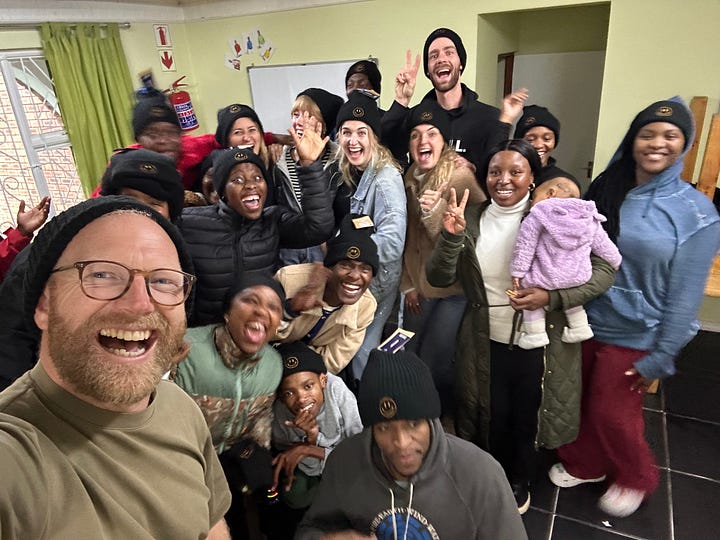
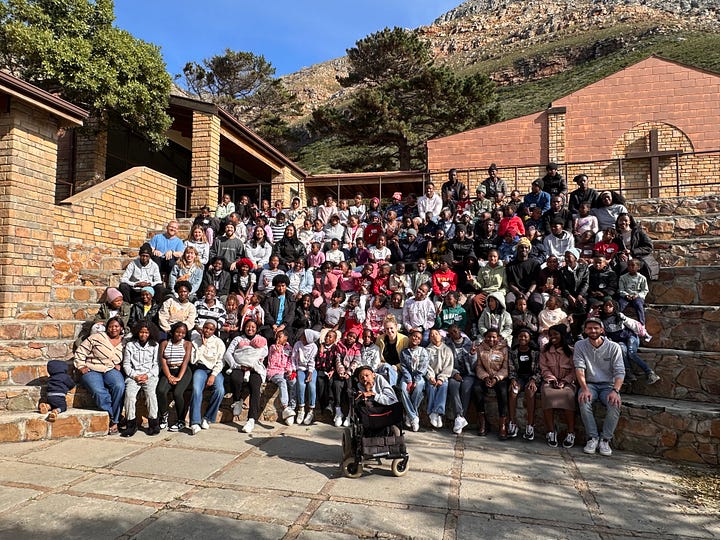
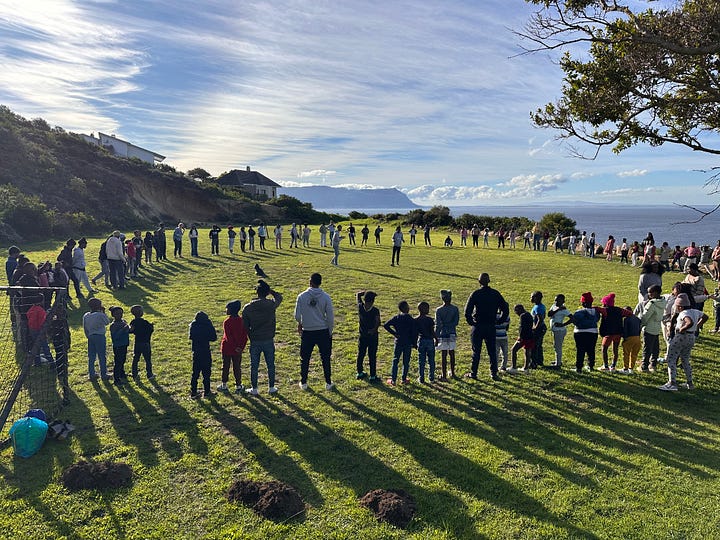
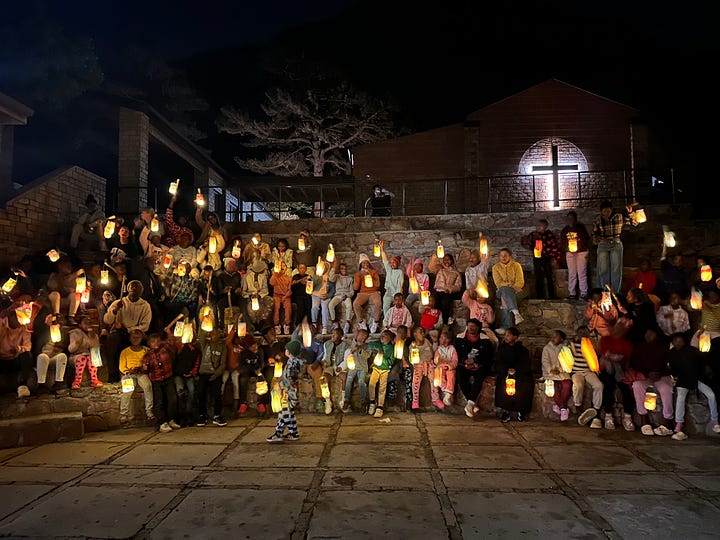
Work
Four short days after camp we flew to Switzerland to help run a seminar in Lausanne on the life of Paul. It was a rich time in the classroom where we delved into the spiritual and theological development of the Apostle Paul through his letters.
Rachel and I led worship (a mixture of musical and liturgical), staffed some of the logistics in driving, creating social times, snacks and one 3 course meal for 19 guests.
Although I taught a few sessions, the time was really anchored by our friend and leader Maureen who has spent a lifetime considering Paul’s writing and personhood and it was a gift to see her give that away so fruitfully.
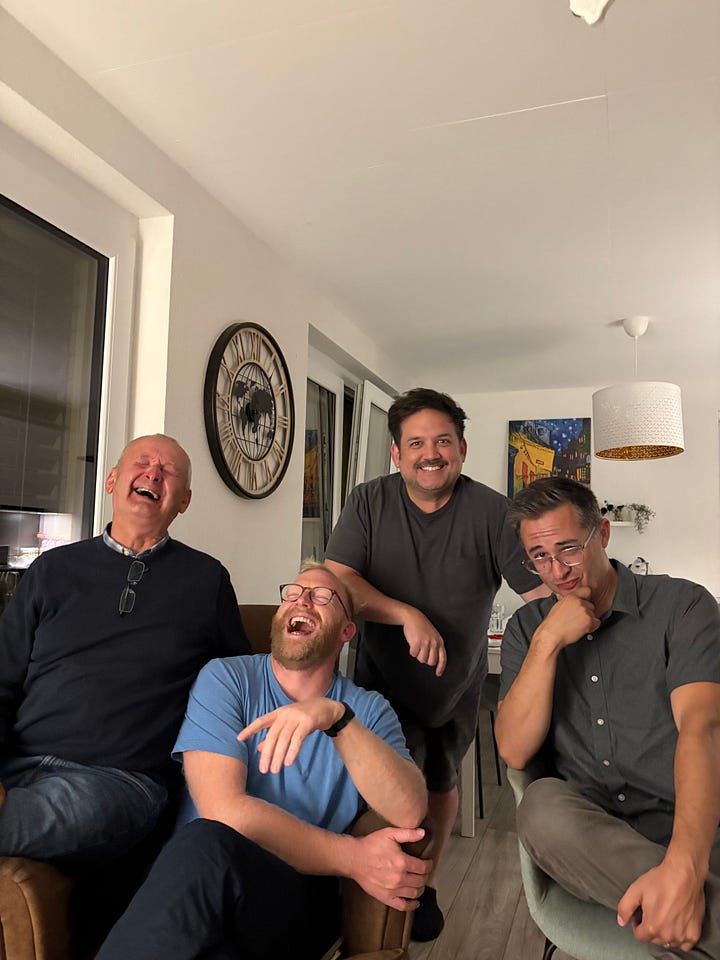
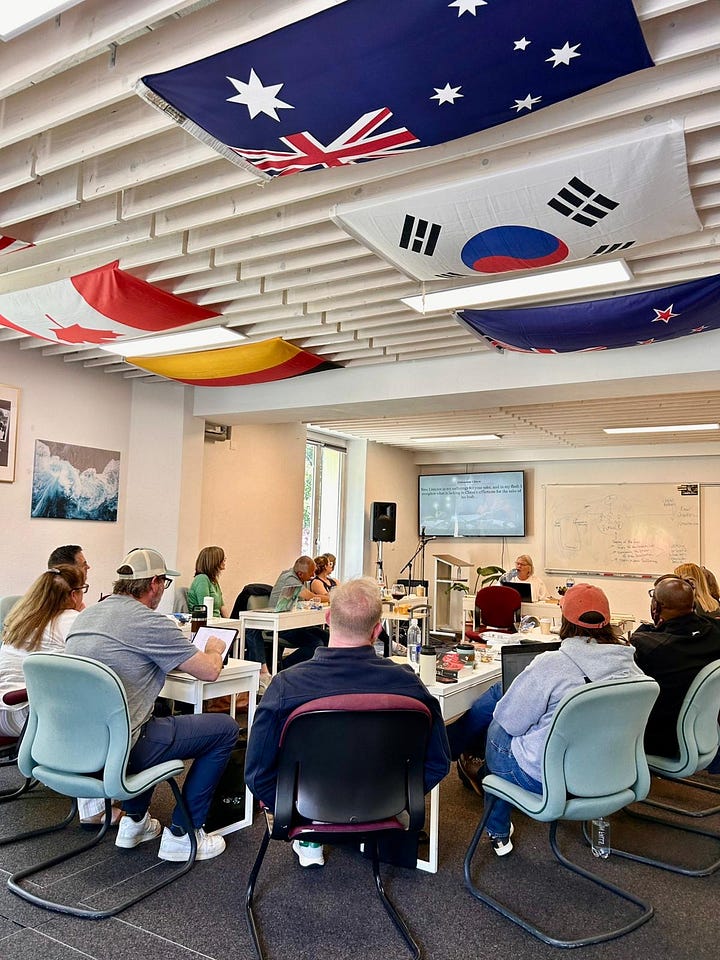
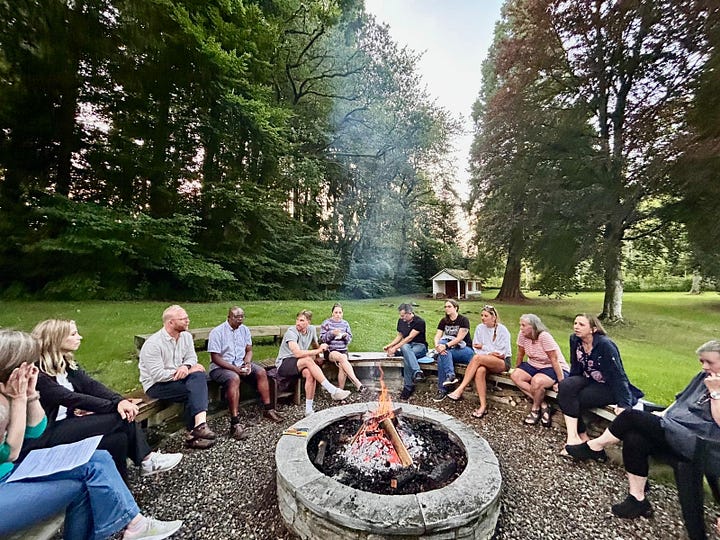
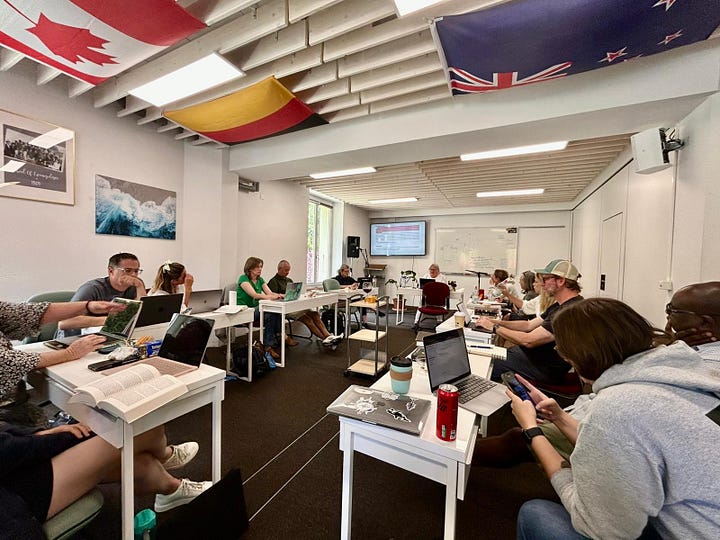
During the time I also shared in the YWAM community meeting there on paying attention to the hungers that drew them to join a neo-monastic learning community like that and it was a gift to be with them for a number of reasons. One being that this was the first YWAM base I ever visited in around 2003 or so, then we have also sent two close family members and friends who have spent time there and who many of those on staff know well.
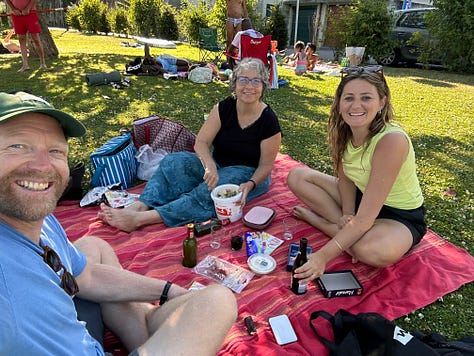
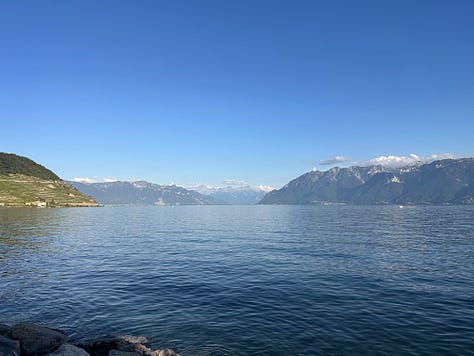
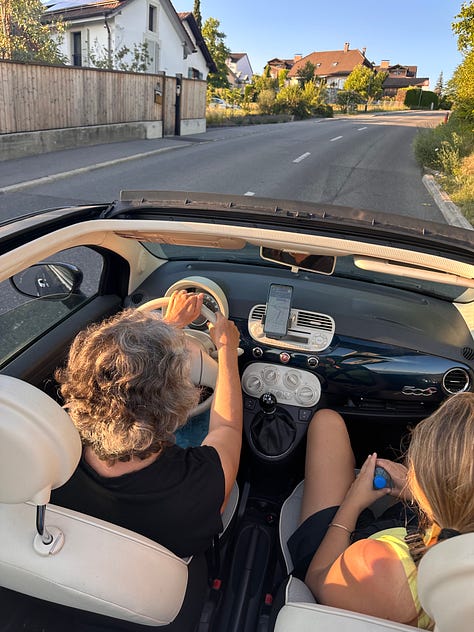
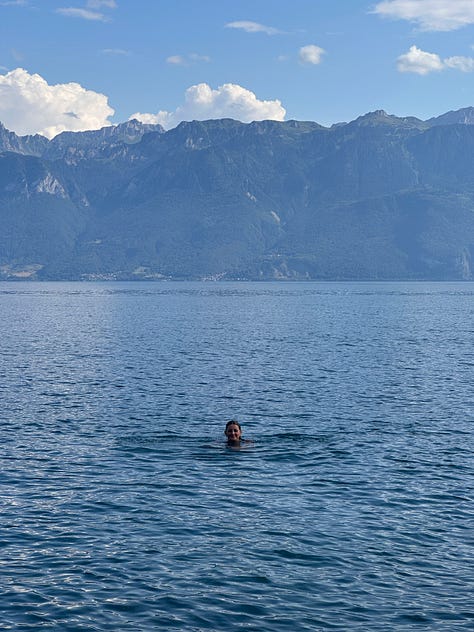
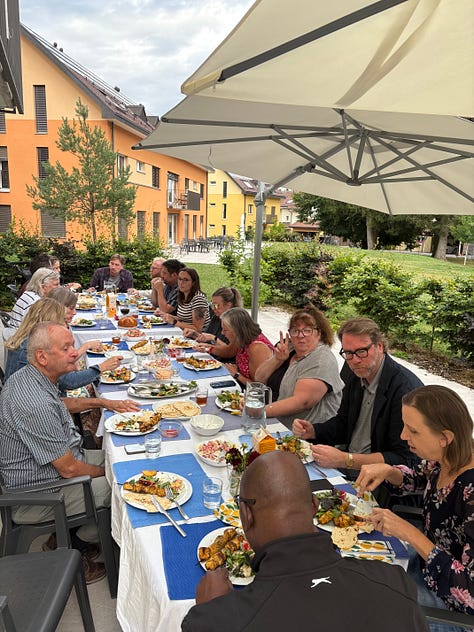
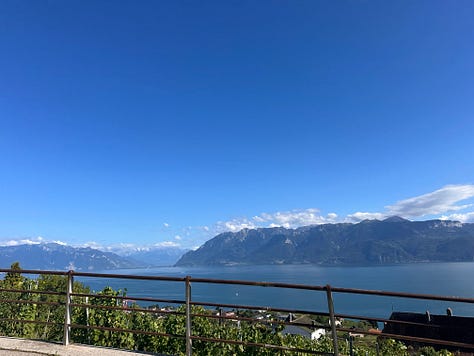
In the prep days and sabbath day we were able to meet up with a dear Swiss friend who took us out to Lake Geneva in her housemates soft top Fiat 500 and we swam in possibly the most glorious vista known to man. Evidence above.
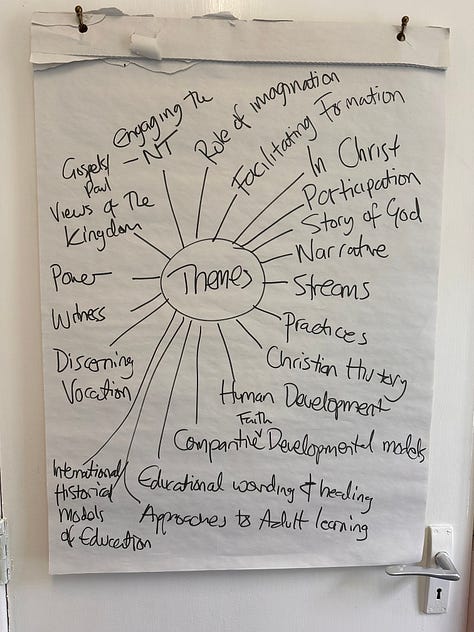
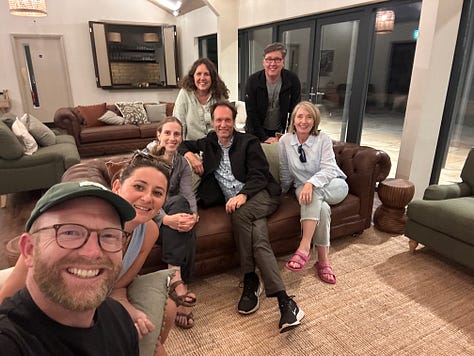

From there we spent a few short days with some co-conspirators dreaming of upcoming training initiatives (that I will undoubtedly share more about here in due time) in the YWAM base in Harpenden, London. The final picture is a sunset view of London urban foxes we spotted on an evening walk before flying home.
Reading
Paul: A Biography by NT Wright
The enjoyment of reading books is only multiplied by reading along with others. This book formed the basis of our conversations in the Life of Paul seminar and it is excellent. Tom Wright is a world renowned pauline scholar and in this book he unpacks a biography of Paul using the biblically available details and then, from a experts opinion offering some possibilities for the gaps which scripture doesn’t speak to.
A few things that came alive to me through this book and the conversations we had in the class in Lausanne;
We only ever hear of evidence of Paul’s sister (in Acts 23:16), but after the Damascus road experience he returns to Tarsus, where he grew up, for around 10 years before Barnabus goes to find him in Acts 11. As we know Paul’s family is jewish, affords him an excellent jewish education in the tradition of the pharisees, his father was a pharisee and has a business in tent making. But we don’t hear any evidence that his family (apart from his nephew, and presumably his sister) become Jesus followers. This is interesting to consider when we put it alongside the family metaphors that Paul then employs extensively in his explanation of what the Church should be. We often think of Paul as a stand-alone super hero, but his possible estrangement from his family, his conflicts with barnabus and the tension with the Jerusalem church created a deep need in him, which he refers to consistently through his letters to various churches, for a familial sense of connection.
After being encountered by Jesus on the Damascus road Paul ‘withdraws to Arabia’. Some traditions theorise that he went to the location of Mount Sinai where YHWH established his covenant with the people of Israel as the beginning of a wholesale recalibration of the jewish story for him as he considered God’s salvation purposes now made known in the person of Jesus.
The Life you save may be your Own: An American Pilgrimage by Paul Elie
This book is a biography of four renowned catholic authors; Thomas Merton, Flannery O Connor, Dorothy Day and Walker Percy. Through each of their pilgrimages with God through their lives, they expressed themselves in works of writing which became beloved and important. It’s an extensive and compelling journalistic effort to chart the overlap of their stories and the way they related to God and their sense of calling as they emerge as literary giants in post world war America.
I Julian by Claire Gilbert
After stalling in the myriad of details Paul Elie includes in the book above, I devoured this book and enjoyed it far more than I anticipated. Claire Gilbert has crafted a fascinating fictional autobiography of Julian of Norwich, the famous catholic mystic and anchoress, famous for her work “revelations of divine love”. The book weaves together her troubled life both before becoming a hermit and during alongside historical details of medieval england that I was unaware of. What made the book particularly luminous though was the reflections on the experience of solitude, contemplative prayer and spiritual direction which evidence Gilbert’s own awareness and sensitivity to the often-times inarticulable character of those experiences.
Eating
Chicken Pot Pie
A few years ago I picked up a Lodge 12-inch / 30cm cast iron pan. It has been the best ‘bang for buck’ kitchen buy (only £25) and as long as you care for it (don’t leave it wet), it should last a generation. With that being said, I think the recipe below would work in a casserole dish if the first steps were completed in a pan and then transferred into the casserole dish before going in the oven.
This week I adapted a Chicken Pot Pie recipe (original from NYT) which was a real hit!
Ingredients
2 Rotisserie Chickens (You could use only 1, but this allowed it to be dense and decadent and we had plenty left over for sandwich meat)
Salt and freshly ground black pepper
3 small carrots, thinly sliced
1-2 celery stalks, thinly sliced
2 garlic cloves, finely chopped
1medium onion, very finely chopped
1tablespoon thyme leaves, coarsely chopped
⅓cup all-purpose flour
2 cups high quality fresh chicken stock
1cup frozen peas
1 frozen puff pastry, thawed but refrigerated.
2 large eggs, beaten
100g of butter
Process
Pick all meat from chicken after it has cooled but is not cold (this helps picking it immensely) being careful to check and remove all small bones. Make sure you get all the meat from the smaller bones as they hold lots of flavour compared to the large pieces of white meat. Then shred with two forks.
Heat Oven to 220C
Use a disc blade on a food processor or chop carrots and celery by hand. Chop onion and garlic as finely as possible or use the food processor method above.
Melt enough butter to comfortably cover the bottom surface of the skillet and if using chicken stock concentrate add once the butter is melted (for fresh stock add a few tablespoons and let it simmer for less than a minute.
Add Onions and garlic, then carrots, thyme and celery and cook until they are softening. (Around 5-7 mins) Season generously with salt and pepper.
Add flour bit by bit, moving the vegetables around so the flour coats them and begins to cook (but not burn). You shouldn’t be seeing any white flour but it should thicken the liquid and begin to yellow and then lightly brown.
Then add the remaining chicken stock, bit by bit while gently scraping any bits that have begun to get stuck to the bottom of the pan.
Add the chicken and peas and gently mix it altogether without mushing the vegetables too much. Continue cooking for a few more minutes, especially if there is too much stock liquid. Finally add a little more salt and pepper.
Take the pan off the stove and remove the defrosted pastry sheet out of the fridge. Roll or unfold until it is flat and then place it over the pan. You can cut the excess off but it should hang slightly over the edge of the pan so it doesn’t shrink into a pastry island!
Then cut 3 approximately 6cm slits, 3 cm apart in the middle of the pie.
Whisk the eggs with 2 tsp of water together and brush them onto the pastry
Bake for 15-20mins at 220c until the pastry has risen and is begin to golden. Then turn down to 180c and cook for 12-15 more minutes. As all of the contents are already cooked, the oven time is simply to cook the pastry all the way through and let it rise and brown. I placed the pan on a rack about a third down as many of the NYT comments mentioned that the pastry can burn easily, so keep checking carefully every 5 minutes or so towards the end while being careful not to let too much heat out of the oven.
Listening
Loaded Honey, a duo formed from the trio who usually make up Jungle (Whose excellent ‘back in’74’ is worth a listen here) came out with an album.. Don’t Speak is a good upbeat track from it
Also greek artist Stella has this great retro pop sounding track - “Titanic”
Finally, firm favourite Jordan Rakei released a live video of his Royal Albert Hall performance on YouTube here;
For those on Spotify, here’s some other tracks I collected last month
Spiritual Formation is a “dedication to reality at all costs”

We came back from our recent travels tired. Despite needing rest after these trips we are always confronted with many small tasks, emergencies and responsibilities which require our attention.
The combination of already being tired goes badly with the complications which are part and parcel of getting seemingly simple tasks done. After this trip it was no different.
We needed new tyres on our car which cost more than I expected and then when we picked the car up, for some reason it wouldn't go into reverse. So then an unexpected mechanic bill. Within the week, after a number of these situations piled on top of each other, I was far from rested, I was frazzled.
Within a few days Rachel, in equal parts wisdom and exasperation, told me: "Go and Sit on a bench!".

Getting ‘in touch’ with Reality
We are fortunate to have a village littered with benches with postcard views that allow me just to sit and come into 'land'. As I was sitting on one of these benches this morning, for a moment I came back to reality.
All the scattered, disconnected tasks, needs and responsibilities, along with my ability to fulfill them is not what is most true of me. What is most true about me is that I'm loved by God. That doesn't make the task list go away, but being rooted in that knowledge can certainly help me move through my days in ways less likely to be capsized by the next thing to go wrong.
What happens when I sit on the bench, is in the midst of the manyness and muchness of the realities of life, I also come in contact with what is also more deeply 'real'.
My life is hidden in God.
Of course, my tasks, tiredness and responsibilities don't magically go away, but I get to hold those realities together with the deepest reality. Being able to be 'in contact' with both of these realities and increasingly integrate and reconcile them to one another is the practical journey of Spiritual Formation. It’s the Christianity 101 we never grow beyond.
Reintegration and reconciliation are at the heart of the gospel and its implicit call to be transformed into the likeness of Jesus. The deep call embedded in the outworking of the gospel is for wholeness and holiness to increasingly be recognised as the same thing.
M Scott Peck, the American psychiatrist, once said:
"Mental health is dedication to reality at all costs."
It has become my conviction that spiritual formation in the way of Jesus is also a dedication to reality at all costs.
The reality of the world God has made and placed us to live within,
The reality of what God has done in Jesus to reconcile us and send His Spirit as His presence with us
The reality of our goodness and giftedness as God's creation
The reality of our brokenness, capacity for self-deception and need for transformation
The reality that, despite all our best efforts and intentions, we need God to save us and make all things new both now and in His future return.
The reality that we are placed in a specific time, a context and relationships with all the privileges and responsibilities that are embedded there.
Most, if not all, brokenness we experience is a shrinking back from what is real, into patterns of self-protection, numbing, distraction, fantasy or self-deception.
We pretend we can separate our presentation of ourselves to the outside world from the inner realities of our lives,
We compartmentalise important big ideas away from the reality of our emotional lives,
We disconnect relationships between friends and those who work with or for us,
We try to protect any present contentment via distraction from past unresolved disappointments.
We present the aspects of ourselves we are most proud of and neglect to confess and receive forgiveness for those we are ashamed of.
All of these disconnects bear down on the deepest parts of our lives, breaking our lives up into incoherent pieces. Unreconciled aspects of who we are, at war with one another.
Reconciling Reality
Whatever else we might describe salvation as, it is well described in Colossians as "the reconciling all things to God" (Col 1:2). The path of Spiritual Formation, of growing up into Christ, encourages wholeness and reintegration, but in order for all things to be reconciled, those things need to be presented and surrendered to the work of God's reconciliation.
And so, the path of spiritual formation requires us to encounter reality. The reality of God and the reality of where we are at.
One of the great enemies of Christian growth is the production of a 'religious persona' or a 'ministry mode' that hides the inevitably complicated real life that lurks behind it.
Over the years, I've sat with many different people who are looking for mentorship or simply processing, and I ask them a bit about themselves. At the beginning of these conversations, there is often some sorting required on my part.
Firstly, I'm sorting through the things they are saying and paying attention to the narrative they are presenting.
Are they too hard on themselves, or are they inflating themselves?
Which areas of their life are they foregrounding, which are they failing to mention?
In this, I'm not necessarily seeking to judge what they are sharing, but just paying attention to what they are and are not sharing.
As I do this, I'm trying to pay attention (at my best, I'm actively doing this with the help of the Holy Spirit) to listen for what's 'real'.
It’s not that the other facts they are organising and communicating are not reflections of what they have done or who they are, but I'm listening for something that sounds candid, something that rings with integrity, vulnerability or openness.
Only when I've heard that do I sense there is a doorway to have a conversation that can touch on what is most real in their lives.
In the fictional autobiography of Julian of Norwich, she speaks as a hermit who has a window to the world where people come and seek her for spiritual advice. The author mirrors something of a similar dynamic;
Each afternoon...I draw aside my curtain to the world and find a soul waiting to speak...They tell me their news and they seek counsel and I have learned how much to say, which is very little and how much to remain silent, which is mostly needed. I am not wise and I do not solve their troubles. But I learn to listen with my face turned towards the person speaking, with my heart open to them and my smile warm in encouragement. I never repeat their words to others and they grow in trust, and in their vulnerable speech comes the clarity that reveals what is needful. I ask that they speak from their open heart and do not waste words of hiding, unless they need to start to speak and let the words run for a while until truth becomes evident, as much to them as to me."
— Claire Gilbert, I Julian, pp. 207
That phrase, "do not waste words of hiding" is what stands out to me here.
How much of our anxieties, distraction and busyness is simply hiding from naming reality.
The reality of what we are not,
the reality of what we wished to become,
the reality of our relationships,
the reality of our deep commitment to keep the charade of 'seem to be',
the reality of God's love for us anyway.
All of those realities are costly ones to come to terms with, maybe the last one is harder to truly receive than all the rest.
Reality is the only place God can meet you
The underlying conviction behind the importance of being 'dedicated to reality', as Peck puts it, is that God can only fruitfully meet us where we actually are. Everything else; where we wish we were, where we want others to think we are, is a fantasy and a projection.
When we come to the ground zero of our lives, both the good and the bad, we have come to a place of honesty, integrity, truthfulness and vulnerability where the work of 'becoming' more of who God intends us to be can take place. Everything else is, bluntly put, attempting to put make-up on a ghost, trying to improve an apparition, trying to polish a fantasy. But God is not afraid of reality, He is welcoming us back to it.
If you are longing to grow in Jesus, you need a dedication to reality at all costs. Many of our projections and performances have become so familiar to some of us that we are no longer sure there is much left beneath them.
To that I would say, trust that God who began a work in you, is waiting to catch you underneath the trap door of fantasy and will be faithful to bring it to completion.
God in Jesus is waiting to meet you amid your real life, the only life you truly have; everything else has simply been a distraction and detour from the gift of surrendering your life into the love that is remaking all things.
Miscellaneous Links
I really enjoy Richard Beck’s writing. As a Christian, psychology professor and amateur theologian, his recent reflection on Humility Stress Tests was very interesting.
You might think of other situations where humility is put to the test. The point here is that these are the relational locations where humility either shines or fails. Our behavior in these moments becomes either oil or sand in the relational gears of life.
Humble people share power, resolve conflicts, accept praise with modesty, spread credit, welcome critical feedback, admit failures, own their mistakes, quickly apologize, willingly learn from others, and treat people of lower status with dignity, care, and respect. Humble people pass the relational stress tests.
People lacking in humility, by contrast, grasp at power, exacerbate conflict, bask in the limelight, hoard credit, get defensive facing criticism, hide their failures, avoid responsibility, fail to apologize, aren't teachable, and treat those of lower status with dismissive superiority.

It is well documented that people are sustaining many less close relationships than before. While Christians do well in studies related to ‘flourshing’ than the overall population in certain areas, leaders tend to do worse than the people that follow them.
Glenn Packiam unpacked his own experience and created a helpful (if, as he admits simplified) explanation of the “Constellation of Relationships” required for health.
In my (perhaps corny) attempt to make it memorable, I use the Lord of the Rings as a framework for thinking about the kinds of relationships we need in our constellation. If you think about it, the apostle Paul had people in each of these categories!
While these 2D frameworks rarely map on well to every person in every season, I thought it was a helpful way to think about the kinds of inputs needed to remain healthy and spot potential gaps.


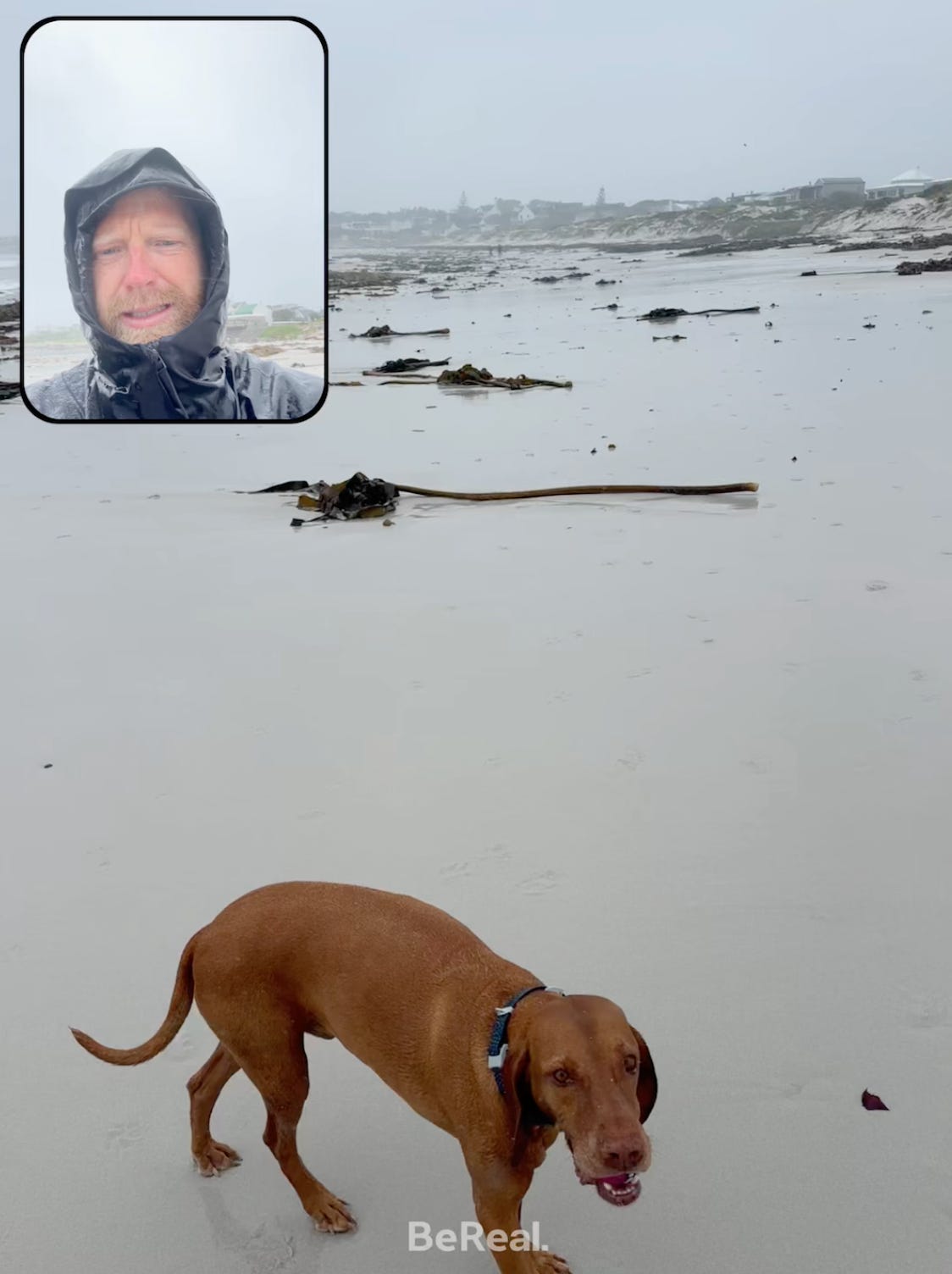
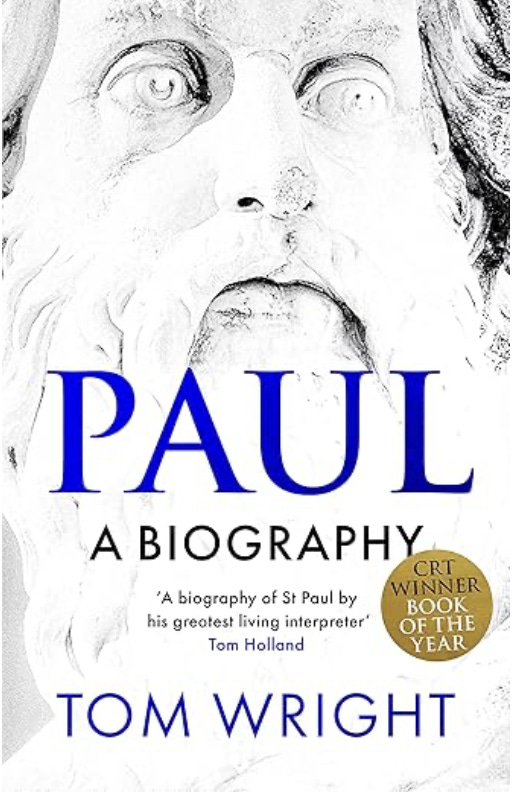
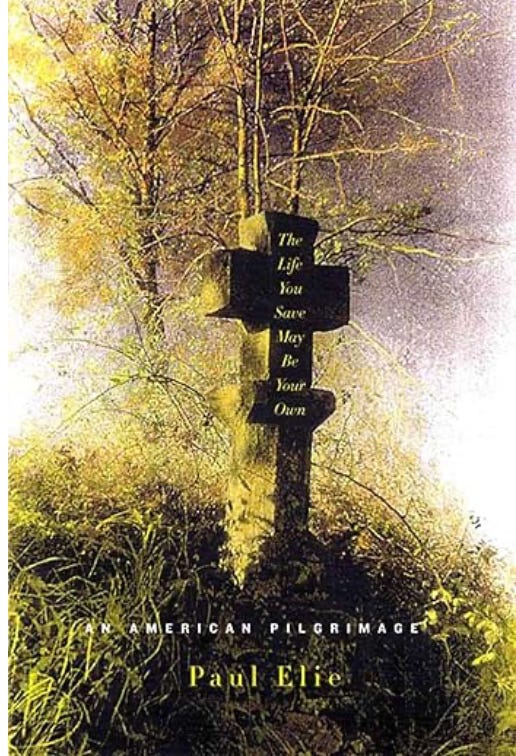
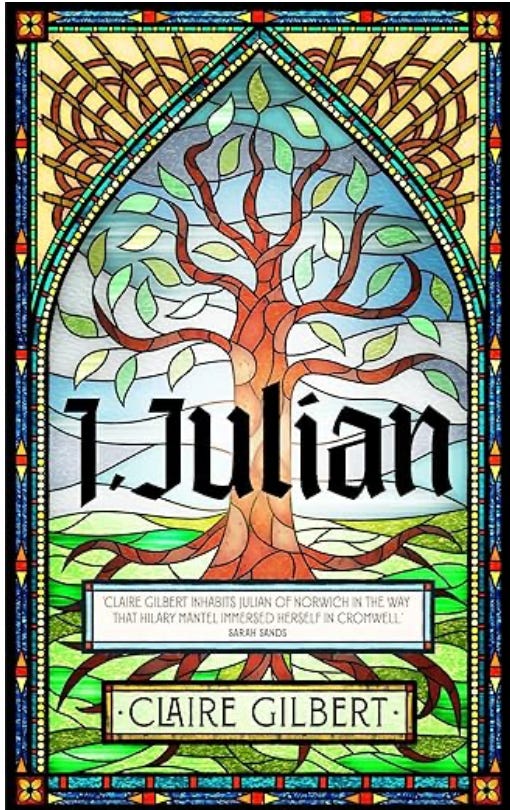
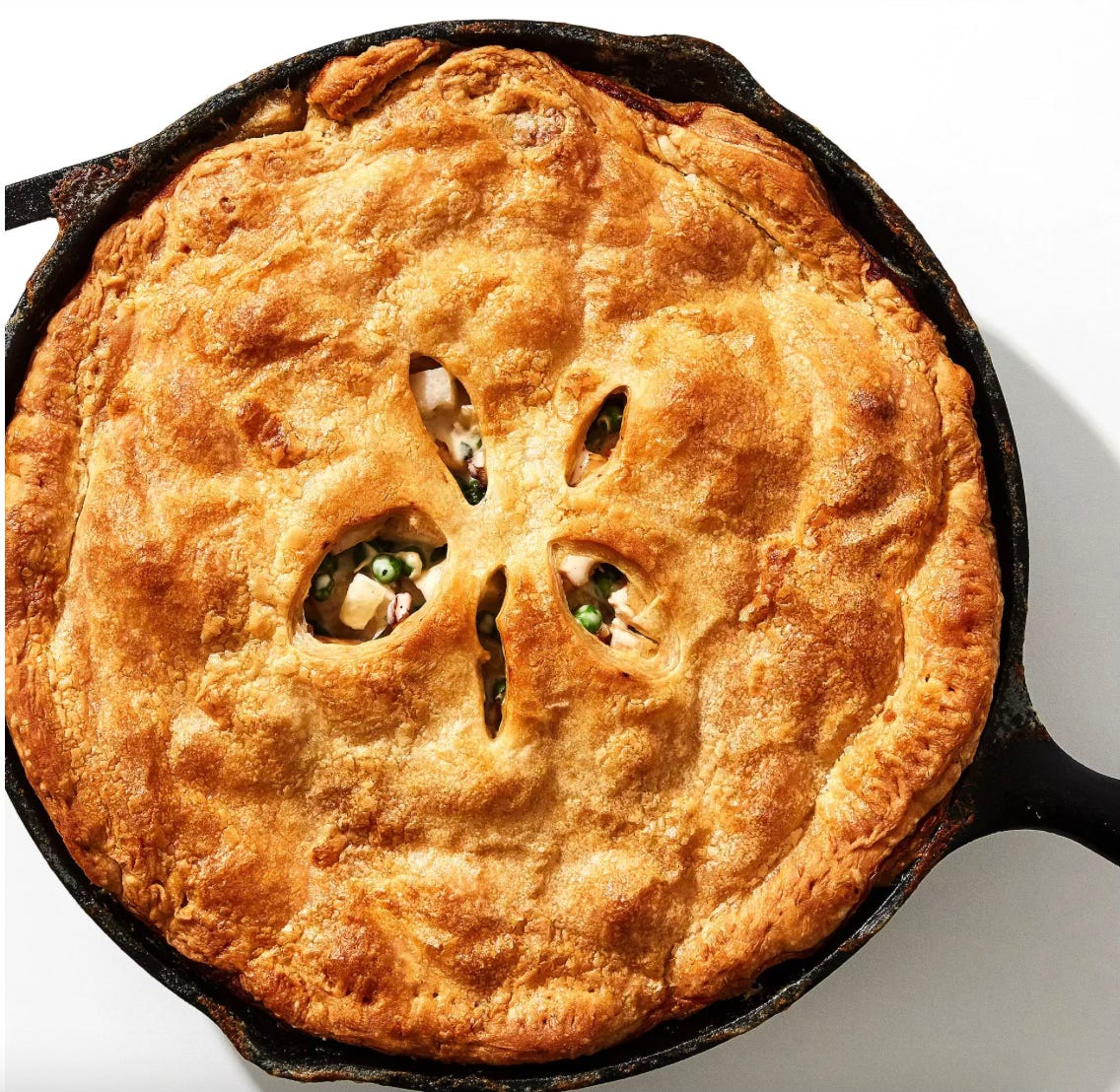

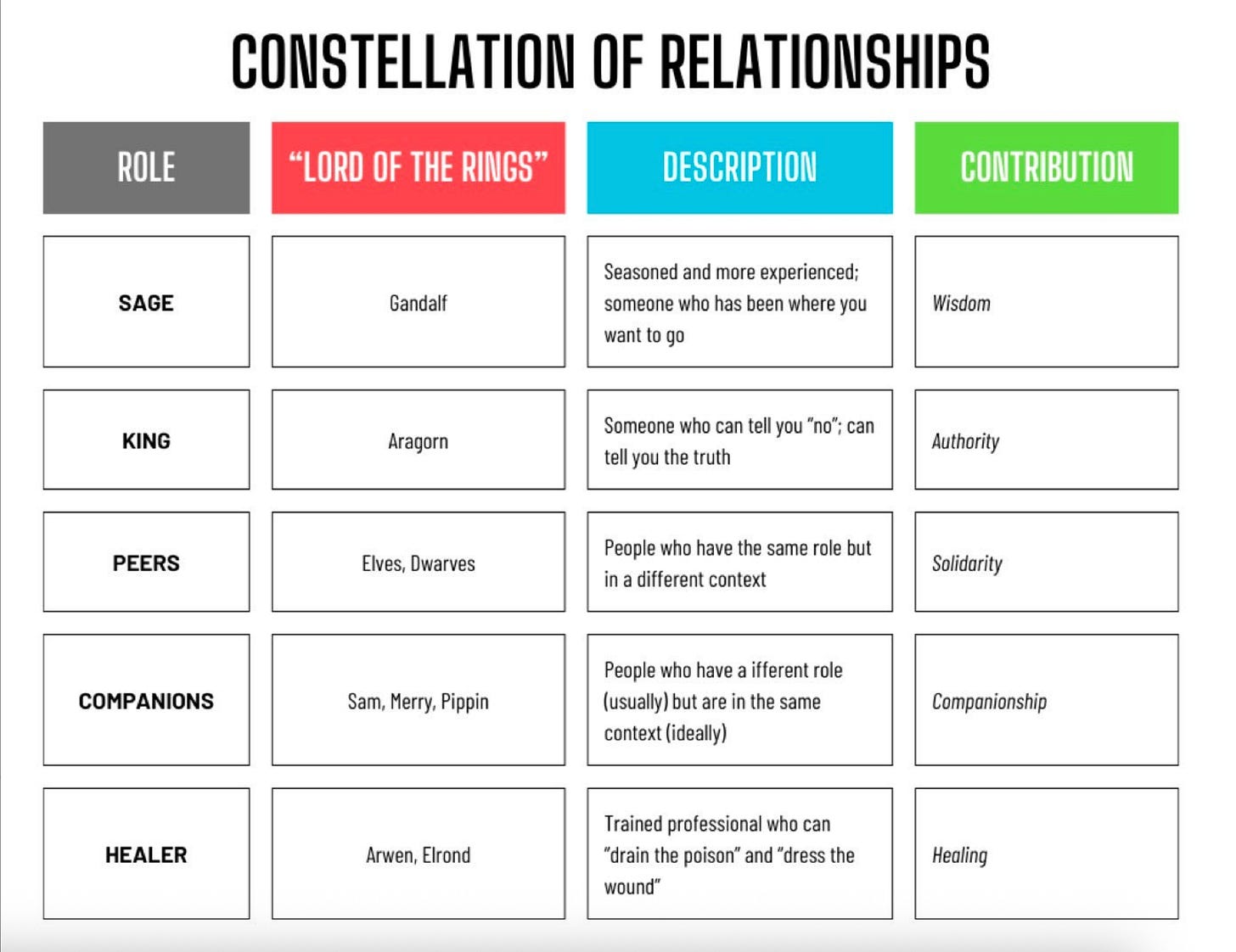

Nice one Liam…love hearing what you are listening for. And love the quote above 👆🏽
Many thanks super son in Jesus! I sat on a bench and read this.....